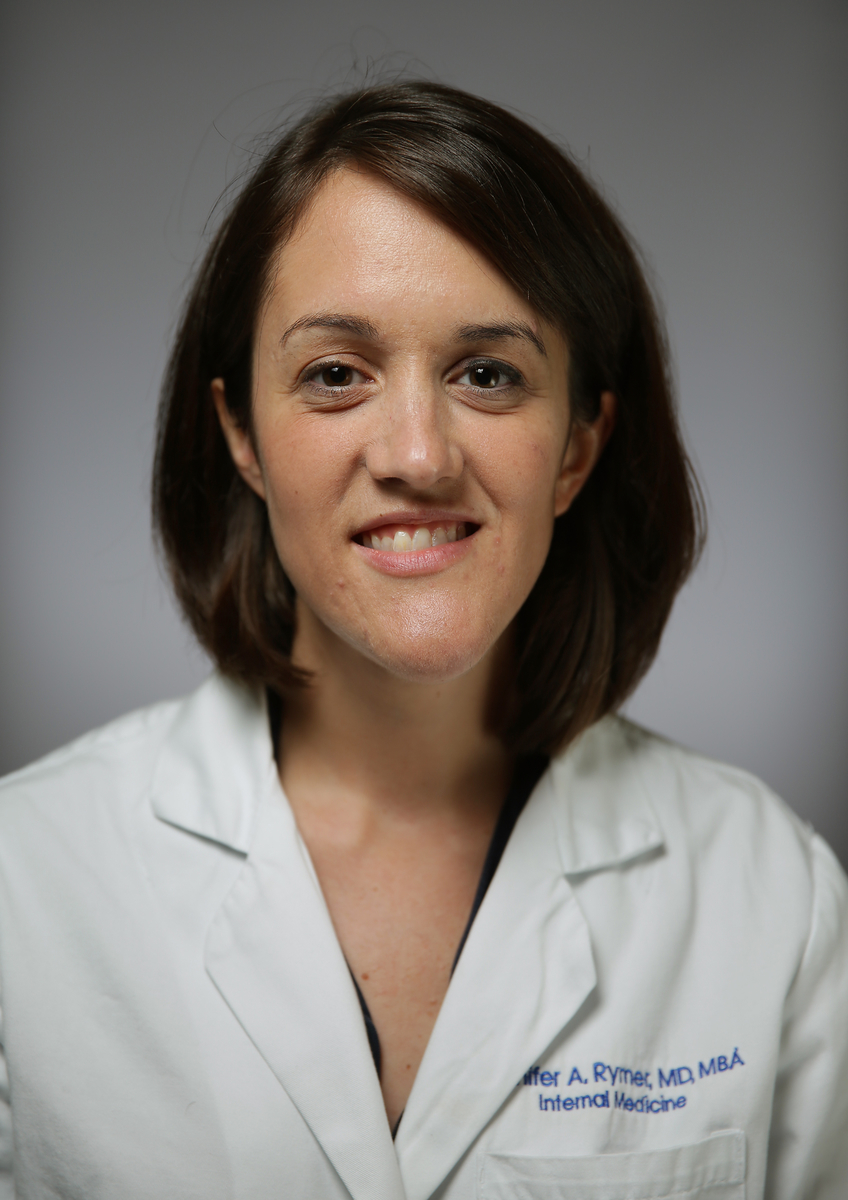
A few months into her role as chief resident of internal medicine at Duke University Hospital, Jennifer Rymer, MD, MBA, is focusing on teaching, resident workflow and developing a new curriculum to supplement house staff education in the intensive care unit.
Dr. Rymer said one of the things she enjoys most about being chief resident at Duke is the teaching that happens during night sign outs, when the chief residents return to the hospital in the evening to go over patients with the residents working overnight.
“Sign outs have been a great way to connect with the new interns,” Rymer said. “It’s amazing how much growth occurs in their development as physicians in a matter of months.”
Rymer said that a lot of the teaching that occurs during sign outs comes in talking through how to approach patients with common symptoms and diagnoses.
“Oftentimes these patients have only been in the hospital for a couple of hours, and talking through the initial plan allows me to help mold the decision-making and also allows the interns to hear how I think about the patient. Ultimately that’s how we learn how to do medicine,” she said.
In the past, only junior assistant residents worked on night float, but this year night sign outs include two interns who are on call overnight at Duke. Rymer said having interns work overnight has given the junior residents a new leadership role. Each night, there is a junior resident who works with the interns and helps them see patients and answers questions, and the interns are able to get valuable experience watching the development of the patient’s treatment course over the course of their call.
As chief resident at Duke University Hospital, Rymer leads resident and intern reports, serves as an attending physician on the general medicine ward, helps manage the coverage schedule, and serves as a sounding board for residents as they plan their careers. She especially has enjoyed helping the senior residents navigate the fellowship match process.
Rymer said she and her co-chief residents, Christopher Hostler, MD, MPH; Armando Bedoya, MD; and Lindsay Boole, MD, MPH, want the house staff to feel that they are there to serve as advocates.
“We want to nurture an environment where people really inspire each other to be at their best, but also an environment that is open and friendly and approachable,” she said.
Rymer said she is always available to answer questions, even in the middle of the night, and her co-chief residents feel the same way.
“Our job is to be advocates, to be approachable and to be here if they are having a hard time or are having challenges in the hospital,” she said.
Studying resident ‘churn rate’
 One of Rymer’s goals as chief resident is to investigate ways to determine how the house staff are utilizing their time on busy rotations like general medicine.
One of Rymer’s goals as chief resident is to investigate ways to determine how the house staff are utilizing their time on busy rotations like general medicine.
“As house staff around the country use electronic medical record (EMR) software now and the volume of patients seen at Duke is increasing, I have become interested in how we are educating our residents,” Rymer said.
She has been working with Ralph Corey, MD, vice-chair for education and global health and a professor of medicine (Infectious Diseases), on a project in conjunction with the Department of Medicine to measure the time house staff spend reading, going to conference, documenting and seeing patients.
“Though there are prior studies out of Johns Hopkins University and Boston Children’s looking at similar questions, I am really interested in how the house staff are engaging the EMR,” Rymer said.
Her goal is to develop a study whereby observers will be utilized to measure the time spent by interns, senior residents, medical students and attendings on a busy general medicine service. This study will also frame the “churn rate” or daily admissions, discharges, transfers, and roll-overs that each physician cares for in a way that is typically studied in the business world.
“It is difficult to define a solution for improving house staff education and workflow until we define the problem. I am hopeful that obtaining a granular look at the day-to-day activities of our residents will help us to identify key issues,” Rymer said.
She also believes that if the methods used in this study are successful here at Duke, they might be of benefit to other academic institutions around the country.
Improving curriculum
In addition to her focus on research, Rymer said another goal of hers for this year is to improve the resident curriculum in the intensive care unit.
“As a cardiology fellow, I spent several months in the ICU,” Rymer said. “We have conferences for inpatient general medicine, and we have ambulatory conferences, but we don’t have a lot of conferences for the intensive care rotations.”
To help boost the ICU rotations, Rymer is developing a series of educational videos on different topics, such as how to interpret an arterial blood gas test, how to understand ventilator settings, and how to have conversations with families about end of life care. She plans on asking expert faculty members from cardiology, pulmonary, allergy and critical care, and neurology to give short talks on different topics that could be filmed and then shared with house staff to watch at their leisure.
“Though there is no replacement for teaching in the moment, we also need a formal ICU curriculum to fall back on as well,” Rymer said.
Duke really stands out against other programs in the breadth of opportunities that are here. No matter if you are interested in global health, being a leader in medical administration, or learning how to run big clinical trials, Duke has people here who are experts in all areas and is a place where you can really develop an exciting career.
Being part of the Duke family
Rymer said one other aspect of her chief resident year that she is looking forward to is being a part of the recruitment season.
“I am very proud to be a part of this program and to have been a graduate of the residency here and now to be a fellow. I’m very interested in recruiting the types of people who will also love Duke and flourish here and really take advantage of everything it has to offer,” she said.
Rymer came to Duke after completing her medical degree and MBA at Vanderbilt University. She said her choice to come to Duke was based on Duke’s Management and Leadership Pathway program as well as its reputation for rigorous training.
“For cardiology fellowship and for internal medicine residency, Duke really stands out against other programs in the breadth of opportunities that are here. No matter if you are interested in global health, being a leader in medical administration, or learning how to run big clinical trials, Duke has people here who are experts in all areas and is a place where you can really develop an exciting career,” Rymer said.
When Rymer completes her chief residency, she will continue with a cardiology fellowship at Duke and go on to do an advanced fellowship in interventional cardiology.
“I see myself pursuing a career in interventional cardiology and using my research time to learn how to manage and run clinical trials,” she said.
Rymer is very close to her co-chief residents and says their families spend a lot of time together outside of the hospital. Rymer stays busy taking care of her son, Will, who is 1, and spending time with her husband, Daniel.